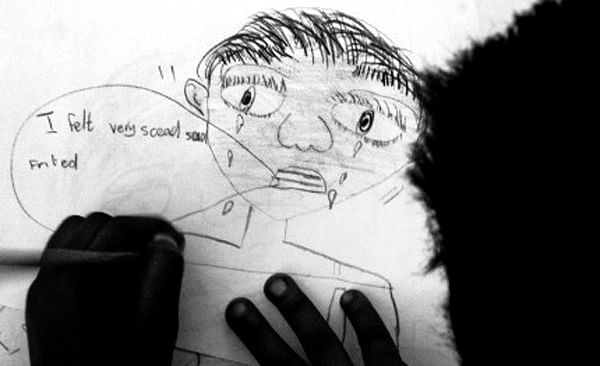In South Africa, children raping children
In South Africa, children raping children

It is hard to imagine – a three-year-old girl being raped. It is even harder to fathom the rapists being children themselves.
But in South Africa, not only is this crime shockingly common, it may be on the rise, according to a CNN report.
Total 45 percent of rapes reported to the police in South Africa are child rapes, and 50 percent of South Africa’s children will be abused before the age of 18, according to South Africa’s Tears Foundation and the Medical Research Council.
For over a decade, photographer Mariella Furrer has worked to document these crimes with powerful photos and accompanying narratives, according to the CNN report by Mick Krever.
She has compiled her work into a nearly 700-page book, “My Piece of Sky”.
“Most child sexual abuse is unreported,” she told CNN’s Christiane Amanpour on Tuesday.
“The most important thing about this body of work really is to try to get people to speak out about their abuse – to have the courage to speak out about it, because there’s a lot of shame and guilt attached to it.”
The opening page of her book quotes the great American poet and author Maya Angelou: “There is no greater agony than bearing an untold story inside you.”
Furrer has a personal connection to her work; she herself was abused as a young child in Kenya.
“I was five years old,” she said. “I was molested by a stranger, a tourist – I think it was some white man in a little caravan. And he touched me.”
“But it felt good. It felt good, and that filled me with guilt, and remorse. And it impacted me in so many ways that I wasn’t really aware of at the time, growing up.”
Life is always stranger than fiction, and some of the stories captured in her book defy belief, Mick Krever wrote.
In one photo, Furrer captured a young girl – she appears to be about three or four – in a nightgown trying to leave a room. The photo’s explanation tells us that she is attempting “to flee a doctor’s room before a medical forensic examination.”
The girl’s nine-year-old relative admitting to playing “sexual games” with her, and he was himself later discovered to have been sexually abused.
“Every day they wake up they are reminded through either a scar on them or a tattoo that dad has put on them – you know, saying ‘Daddy loves you,’ or things like that,” Furrer said.
Child sexual abuse is particularly prevalent in South Africa, but it is a global problem, Furrer said.
“It transcends any social, economic, and racial boundaries. And it’s everywhere.”
One of the most shocking revelations of Furrer’s work is that it is that the abuse is not just a case of adults taking advantage of vulnerable children, but indeed children abusing other children.
In another photo, a nine-year-old boy is shown in the back of a car, being driven to meet with a police social worker.
He was allegedly “gang raped and beaten with metal pipes and sticks by his ‘friend,’ two eight-year olds, three eleven-year olds and a thirteen-year old.”
They then tied him to a tree and left him there over night. The boy “never disclosed what happened,” so his perpetrators never went to trial, the book says.
“As we don’t speak out the perpetrator will continue,” Furrer said.
To her own surprise, Furrer told Amanpour that she discovered that she could find humanity in the perpetrators of these horrific crimes.
“When I was working with the police and these children coming in I was like, my goodness, if anyone comes in now I will kill them myself.”
That changed, she explained, when she started working with the offenders, said the CNN report.
“I don’t feel affection for them, but I, I could see the different facets of each personality.”
“And one in particular I remember was a perpetrator from Namibia, who would have been a friend. You know, he was witty, intelligent, funny – and he abused children.”
The problem is that the potential perpetrators are not being identified, and helped.
“If there is a problem, and they’re sent to counselling and taught appropriate sexual behaviour, there will not be a problem. It’s that we’re not catching these children in time.”
With such shocking statistics, it is easy to say that South African authorities are failing at their job to contain the problem.
When it comes to the police that Furrer worked with, at least, she said that this is not the case.
“The police that I worked with are so dedicated to the protection of children. I mean, to the extent that they’re going through divorces, they’re working overtime.”
One her favourite police officers, she said, was “Stroppie” Grobbelaar, pictured here.
“He is in the police search and rescue unit – dog unit,” she explained. “And we’ve spent about a month at this point searching for a little girl who went missing, and was last seen walking hand-in-hand with an unknown man. Every evening after the search he would come back to this mother.”
In the end, the girl was never found.
“I have post-traumatic-stress disorder, I suffer from depression,” she said.
“It’s extraordinary the impact of carrying other people’s stories with you. And there’s a great difficulty for me to release these stories because I feel they’ve been given to me and they are very sacred. So it’s difficult to let them go.”